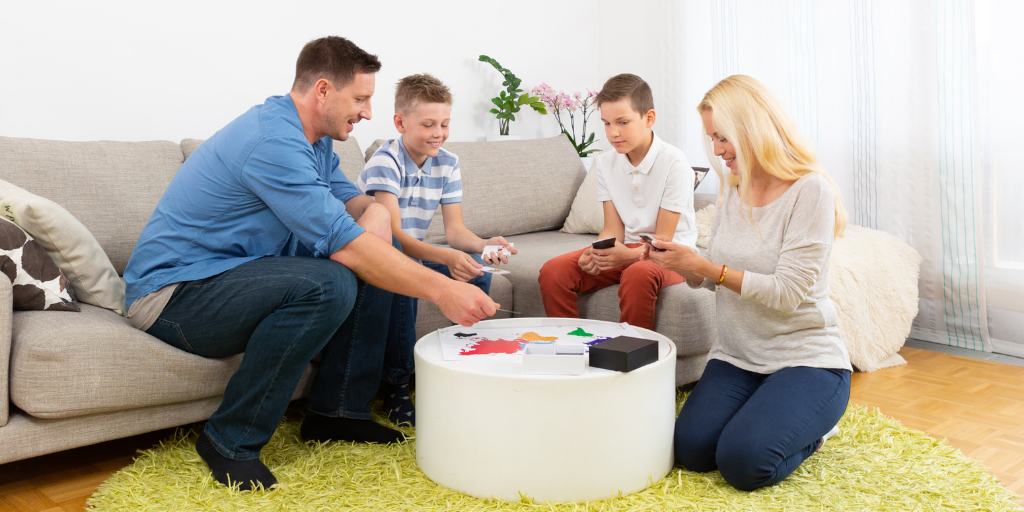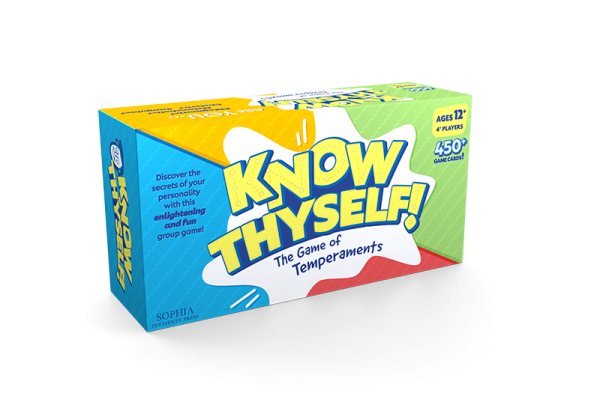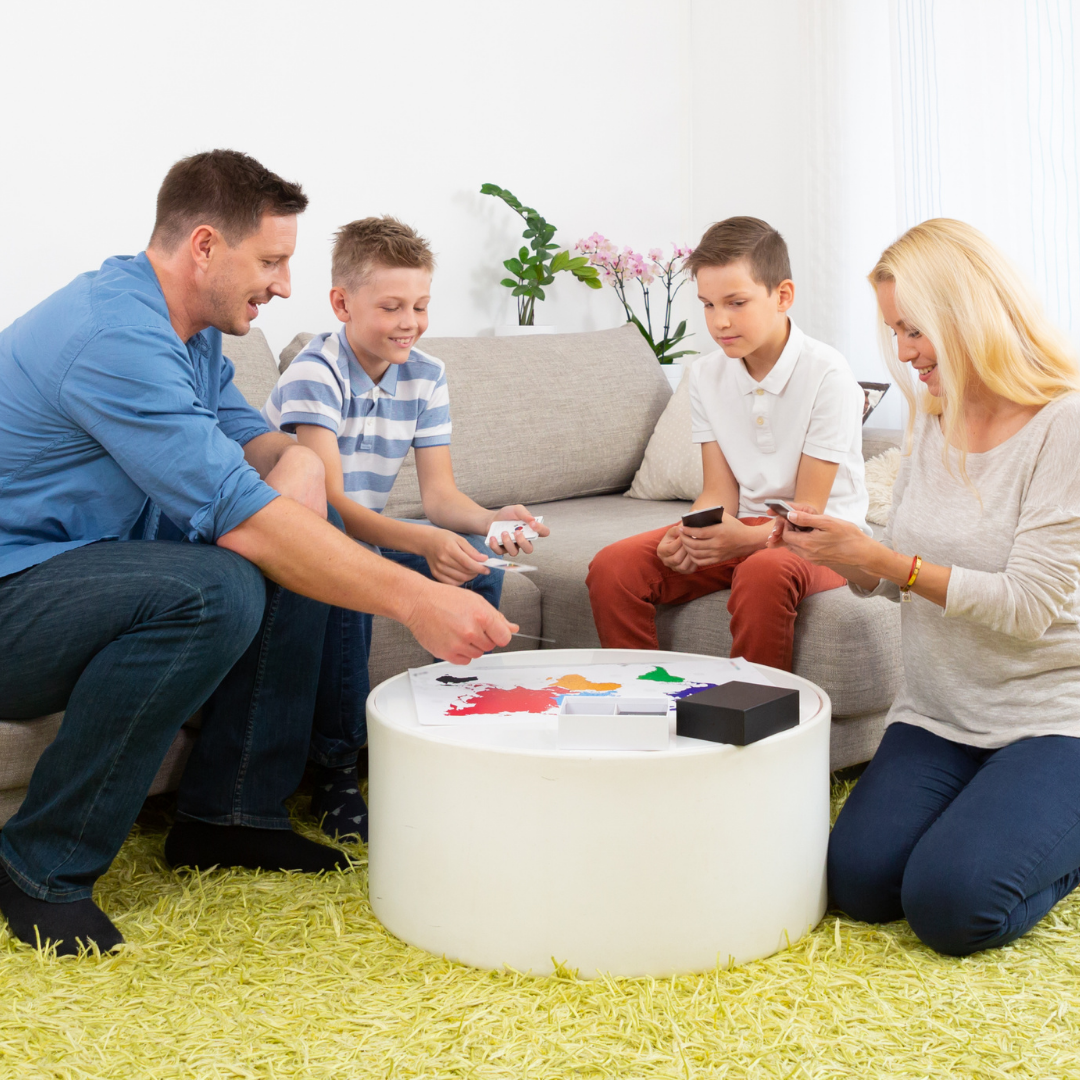
Susan Ciancio reviews Know Thyself, a new game to help parents and teens understand each other's temperaments.
Ever since they were toddlers, my children and I have enjoyed playing games together. I always laughed when I saw commercials that encouraged families to have a “Family Game Night” because we would play a handful of games every day. Playing games opened new worlds for us. It was how we connected. It was how we learned. Plus, it gave us countless hours of fun and laughter.
That’s why I was excited to review a new game from Sophia Institute Press called Know Thyself! The Game of Temperaments. My kids are older now. Just two were around to play the game, but despite the fact that it says ages 12 and older, my boys (ages 20 and 16) and I had a great time playing this.
 While the box suggests four or more players, the game can be played with three, but it definitely would be more fun if the number of players increased. Since we didn’t have the requisite number of people, we made do.
While the box suggests four or more players, the game can be played with three, but it definitely would be more fun if the number of players increased. Since we didn’t have the requisite number of people, we made do.
As the title suggests, this is a game of learning about your temperament. Before we played the game, we read the description on the master cards of each of the four temperaments—choleric, sanguine, melancholic, and phlegmatic—and we each chose what we thought we would be. In fact, we were all in agreement for who matched which temperament style, so we were curious to find out if the game was “right.”
The game consists of 480 color-coded cards that each contain a word or phrase that corresponds to one of the four temperaments. My only qualm with this game is the fact that the 480 cards came divided into the four categories—so they had to be shuffled. And well. Do you know how long it takes to adequately shuffle 480 cards? A long time!
After shuffling, we were finally able to begin. Each player is dealt six cards, and after playing, should draw another so that everyone always has six. The game is played in rounds, with a winner for each round. Each round has both a “judge” and someone who is the object of the round. Players look through their six cards and choose the card that best describes the person who is the object of this round’s play. Those people then hand their cards face down to the judge, who mixes them up so he doesn’t know who chose which word. He reads them all and decides which best matches that person’s personality.
Once he chooses, he gives the card to the person who is the object of the round, and the winner gets a “round winner” card. Play moves around the table and proceeds until someone has the requisite number of round winner cards. At the end, each person is left with a stack of cards that supposedly describes him, and then using the color codes can read the master card to see if that personality type adequately describes his personality.
While we agreed that the cards we ended up with matched our personalities, we didn’t think that the overall personality type matched our true personalities. But it didn’t matter. We still had fun—and a lot of laughs. Plus, we were able to see ourselves from someone else’s point of view. I think that was one of the most eye-opening parts of this game.

I also really liked that some of the words on the cards required us to think about how they could be applied to each person. For instance, “oak tree” led to both my older son and me thinking that meant he was solid. Many definitions are open to interpretation. Some seemed a little impolite—like “slow processor” or “Eeyore”—and as a parent, I would never use those words to describe one of my children, even if I thought it (which I do not). But some—like Jimmy Carter—were slightly confusing and opened funny conversations. We had to wonder what it was about Jimmy Carter that the game wanted us to note. A disliked and not-so-great president? A peanut farmer? Or did it want us to think about his humanitarian efforts after his presidency? Who’s to know?
Other descriptions such as “Great Balls of Fire” led to funny conversations about the movie Top Gun. Some mentioned the names of books, such as Travels with Charley and A Moveable Feast. We weren’t quite sure what to do with those.
I did like that some were great vocabulary words, so younger children can expand their vocabulary with this game. Words such as “audacious,” “affable,” and “placid” are great words for young kids to become familiar with.
We played the game for over an hour, and we still have probably 2/3 of the cards to go through.
The mark of a good game is if the kids say they want to play it again, and that was the consensus with Know Thyself. We will definitely be playing this game again!
Copyright 2022 Susan Ciancio
Images: Canva
About the Author

Susan Ciancio
Susan Ciancio has a BA in psychology and a BA in sociology from the University of Notre Dame and a master’s in liberal studies from Indiana University. Since 2003, she has worked as a professional editor and writer. She is executive editor for the Culture of Life Studies Program and editor of ALL's Celebrate Life Magazine.


.png?width=1806&height=731&name=CatholicMom_hcfm_logo1_pos_871c_2728c%20(002).png)
Comments